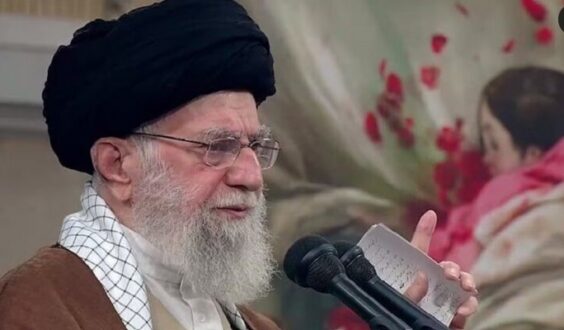iranintl – Two significant trends mark the orchestrated 2024 elections in Iran: the notable significance of invalid or blank votes and the strife among winning factions loyal to Khamenei.
Despite the objections of Khamenei’s confidant, Gholam-Ali Haddad-Adel, the ultraconservatives fielded six lists for Tehran, whose representatives will wield considerable influence in parliament’s management. Internal conflicts between pro-Khamenei factions are exacerbated in the absence of more moderate politicians who were barred from competing in the elections.
The unprecedented number of blank votes and the infighting among hardliners underscore Khamenei’s waning influence over his supporters and the election manipulation apparatus.
Conducting rigged elections in the Islamic Republic has become increasingly challenging. Citizens capture videos from polling stations, revealing lower turnout than the government asserts. Furthermore, individuals can express discontent with the voting system by submitting invalid handwritten ballots. This tactic may also serve to avoid potential repercussions for non-participation, such as employment disqualification or promotion denial.
Voting for a popular footballer
An election boycott movement was underway for weeks. It was clear for months that most Iranians, deeply dissatisfied with the regime, would boycott the elections, and the decision by hardliners to keep other regime supporters out did not help the situation. Amid a low turnout, many of those who voted cast blank votes. Mohammad Mohajeri, a conservative commentator tweeted that the number of invalid votes were higher than the number of votes top contenders were able to get in Tehran.
Confirming the significant increase in the number of invalid votes, Didban Iran website wrote, “After counting 80% of the ballot boxes in Tehran, there were more than 380k invalid votes,” even though the first person has about 340k votes.” The invalid written votes consisted of soccer symbols and names of footballers. In Yazd, the number of invalid votes is about 29,000, in second place.
It seems that invalid votes in Iran’s engineered elections are gradually becoming a permanent phenomenon. In the presidential election of 2021, invalid votes came second after Ebrahim Raisi, at 13 percent. There are reports of 30% invalid votes in this parliamentary election.
People’s power
The Guardian Council and higher authorities aimed to manipulate both the candidate pool and public opinion through discretionary oversight. However, people are now countering these tactics by casting invalid votes, undermining the system’s efforts to engineer public sentiment. Submitting invalid votes in the Islamic Republic serves as a means to avoid potential prosecution for abstaining from voting while simultaneously mocking the political establishment.
Engineered elections typically offer both advantages and drawbacks for the regime. With each repetition, however, the costs of these sham elections are outweighing their benefits. They increasingly embarrass the regime by exposing its lies, fraud, manipulation of numbers, and propaganda tactics to the public eye.
Insider infighting
Another consequence of engineered elections is the escalation of tensions among insiders vying for limited sources of power. In Tehran, after counting approximately two-thirds of the votes, Mohammad Baqer Ghalibaf, the former Speaker of Parliament, found himself in fourth place. Ghalibaf is now in competition with a member of the Mohammad Taqi Mesbah Yazdi cult, a cleric known for issuing fatwas sanctioning violence against those who defy Sharia law in their private lives.
The formation of a unified candidate list for Tehran was crucial for the hardline faction ahead of the election, but this did not materialize. Instead, six separate lists were published, each with its own distinct differences. Essentially, this divergence led to a war of competing lists, with Mesbah’s followers, organized in the Paydari front, gaining ground over traditionalist Islamists. Even close associates of Khamenei, such as Haddad-Adel, who spearheaded the main list of fundamentalists, emerged as losers in this internal power struggle.
Ghalibaf’s speakership in jeopardy
To undermine Ghalibaf’s influence and remove him from the speakership of the 12th Majles, supporters of Mesbah Yazdi employed various tactics to weaken Ghalibaf’s allies. They insisted that Morteza Aqa-Tehrani, a prominent figure of the Paydari Front, be positioned as a top figure alongside Ghalibaf on the electoral list. Ultimately, Ghalibaf acquiesced to this demand, but the outcome reveals that some Paydari supporters refrained from voting for Ghalibaf.
Simultaneously, some of Ghalibaf’s allies abandoned him midway and aligned with his adversaries. After parting ways with the Ghalibaf-Haddad united list, they joined other coalitions such as the “Amna” list. This coalition, led by Hamid Rasa’i allied with other fundamentalist groups to dismantle the Ghalibaf coalition. Rasa’i is recognized as one of the most extremist figures among the fundamentalist lists.
The role of Alireza Zakani, the mayor of Tehran, is also noteworthy in dealing a blow to Khamenei’s influence. Zakani spearheaded another list known as the United Front of the Revolution, which shared many similarities with the Paydari list. The recent elections appear to mark the beginning of the decline of Ghalibaf and Haddad Adel’s influence in the legislature.
 Shabtabnews In this dark night, I have lost my way – Arise from a corner, oh you the star of guidance.
Shabtabnews In this dark night, I have lost my way – Arise from a corner, oh you the star of guidance.



